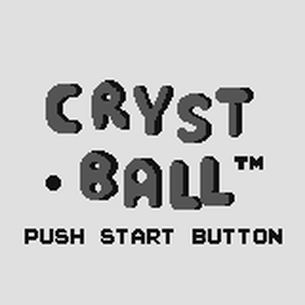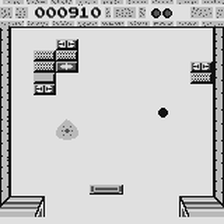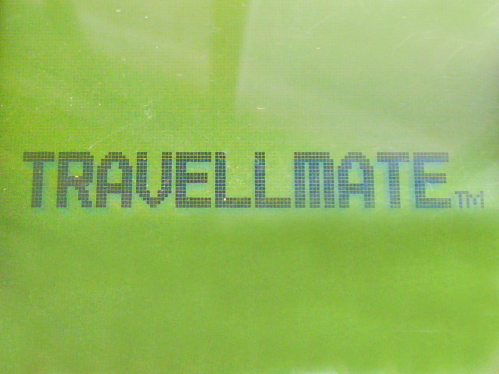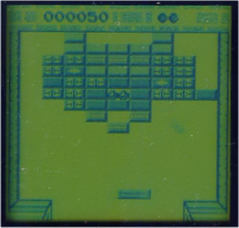REVIEW: Crystball

Game Title: Crystball
Genre: Arcade/Paddle
System: Watara Supervision
Developer: Bon Treasure
Release date: 1992
Genre: Arcade/Paddle
System: Watara Supervision
Developer: Bon Treasure
Release date: 1992
It’s almost sadly ironic that, while typing up this review, the word processor’s autocorrect kept trying to change the Supervision’s choice of pack in game’s title to ‘Crystal ball’.
Perhaps if Watara had consulted their own crystal ball then they might have realised that bundling you new hardware with a piece of software that instantly exposes one of its core weaknesses was not a good idea.
For you see, the Supervision had a major problem and that problem was ghosting; that tendency for fast moving objects to blur into a difficult to define splodge when moving at a fast pace. Of course, knowing this, some clever Hong Kong executive decided that the first Supervision game everyone should play would be a game with a tiny ball pinging around all over the screen in a horrible blurry mess!
All of this is somewhat of a shame as, stripped of it’s inherent hardware limitations, Crystball is a better than average Breakout/Arkanoid clone, with plenty of powerups, warps and tricks to keep the player interested. It’s certainly far superior to its nearest competitor, Nintendo’s surprisingly dull Game Boy title Alleyway.
The Supervision’s large screen does help somewhat mitigate the difficulty of seeing where the ball and bat are moving and it’s honestly not as awful to the naked eye as it appears to be on certain Youtube videos of people playing it in front of a camcorder. More of a problem is the limited ball physics which will only ever move in fixed diagonals regardless of where your bat strikes it.
Perhaps if Watara had consulted their own crystal ball then they might have realised that bundling you new hardware with a piece of software that instantly exposes one of its core weaknesses was not a good idea.
For you see, the Supervision had a major problem and that problem was ghosting; that tendency for fast moving objects to blur into a difficult to define splodge when moving at a fast pace. Of course, knowing this, some clever Hong Kong executive decided that the first Supervision game everyone should play would be a game with a tiny ball pinging around all over the screen in a horrible blurry mess!
All of this is somewhat of a shame as, stripped of it’s inherent hardware limitations, Crystball is a better than average Breakout/Arkanoid clone, with plenty of powerups, warps and tricks to keep the player interested. It’s certainly far superior to its nearest competitor, Nintendo’s surprisingly dull Game Boy title Alleyway.
The Supervision’s large screen does help somewhat mitigate the difficulty of seeing where the ball and bat are moving and it’s honestly not as awful to the naked eye as it appears to be on certain Youtube videos of people playing it in front of a camcorder. More of a problem is the limited ball physics which will only ever move in fixed diagonals regardless of where your bat strikes it.
The game does offer unlimited continues to help you overcome the annoyance of randomly dying due to mistimed hit-detection courtesy of the aforementioned ghosting, however, having reached what we suspect to be the final stage and spent over an hour trying to best it, we have long ago decided that the level is, in fact, next to impossible to beat due to the enemy positioning (a trick that at least one other Supervision game also pulls).
The music, while not as ear-piercingly offensive as some Supervision titles is the same looping theme throughout and could have done with a mix-up every ten stages or so to prevent it grating on the players ears. Bosses would also have made for more variety in gameplay, although there are enough quirks in the level design to prevent tedium setting in, as it does in Nintendo’s Alleyway.
Had the latter been Nintendo’s launch title for the Gameboy then Crystball would have beaten it hands down, even with the inherent problem of ghosting. Unfortunately, for Watara, Nintendo had Tetris. The rest is history.
Score: 6/10
The music, while not as ear-piercingly offensive as some Supervision titles is the same looping theme throughout and could have done with a mix-up every ten stages or so to prevent it grating on the players ears. Bosses would also have made for more variety in gameplay, although there are enough quirks in the level design to prevent tedium setting in, as it does in Nintendo’s Alleyway.
Had the latter been Nintendo’s launch title for the Gameboy then Crystball would have beaten it hands down, even with the inherent problem of ghosting. Unfortunately, for Watara, Nintendo had Tetris. The rest is history.
Score: 6/10




